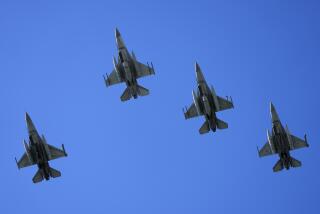CRISIS IN THE BALKANS : Downing Deepens Clinton’s Woes : Politics: With the fate of the pilot unknown, the President may find his Bosnia policy a tough sell. Public is already skeptical.
- Share via
WASHINGTON — The downing of an American fighter pilot over Bosnia-Herzegovina on Friday was a stunning stroke of bad luck for President Clinton that could have scarcely come at a worse time.
With Congress and the public already deeply skeptical about greater U.S. involvement in the Balkans conflict, the incident dealt a blow to Clinton’s efforts to win domestic support for his policy of offering ground troops to help redeploy, strengthen or withdraw U.N. peacekeeping forces if requested by the United States’ allies.
“People here are very unhappy,” one White House aide said, acknowledging that the shoot-down would deepen the political troubles confronting the President. Another aide said that concern in the White House that the United States could be drawn into a military quagmire is already “considerable.”
“This definitely complicates the matter,” said Rep. Lee H. Hamilton (D-Ind.), the ranking Democrat on the House International Relations Committee. For Clinton, “this is going to make the policy much harder for him to sell.”
Administration officials acknowledged that their options in Bosnia are limited and unattractive because of the potential loss of American life.
In the short term, they said, Clinton hopes that the pilot of the downed F-16 can be rescued or returned peacefully.
And while the President on Friday grimly reaffirmed his offer to send U.S. ground troops to help redeploy U.N. peacekeepers, he said he hopes that such an operation--which would carry the risk of more casualties--will turn out not to be necessary.
“I want to reiterate and make absolutely clear that our policy on Bosnia remains firm,” Clinton told reporters at the White House, adding that he is “very concerned” about the pilot’s fate.
White House Press Secretary Mike McCurry denounced the Bosnian Serbs who shot down the F-16 jet as “outcasts and international pariahs” and said the United States needs to stand by Western allies at a time when efforts to calm the long-running war has been thrown into turmoil.
North Atlantic Treaty Organization planes have been enforcing a “no fly” zone over Bosnia for two years or so without any loss to Americans--until this highly sensitive moment.
*
In a piece of rare good news for Clinton, British and French officials, whose armies make up the largest share of the U.N. force, said Friday that they too hope to avoid a U.S.-assisted redeployment operation because they are concentrating instead on creating a rapid reaction force that would be able to better protect peacekeepers--making redeployment unnecessary.
The President’s offer to send troops came under heavy fire from Republicans and Democrats in Congress, even though he quickly added that he envisions only a carefully limited, “temporary” mission.
But Clinton refused to retreat on the point, arguing that the United States has what McCurry called “a moral obligation” to its NATO allies. Officials also said that any hint of waffling on Clinton’s part could be even more damaging than the initial offer.
Clinton met late in the day with Defense Secretary William J. Perry and Gen. John M. Shalikashvili, the chairman of the Joint Chiefs of Staff, for last-minute consultations before Perry and Shalikashvili fly to Paris to meet with British, French and other NATO countries’ defense officials.
White House spokeswoman Mary Ellen Glynn said they discussed “contingency planning, the status of the F-16 and the hostages, and the meetings in Paris” but refused to provide any details. In addition, Clinton spoke by telephone with French President Jacques Chirac.
The President also had to contend with conflicting advice from members of Congress and other quarters over whether he should retaliate against the Bosnian Serbs for shooting down the F-16.
Hamilton said the downing risks drawing the United States more deeply into the crisis by increasing pressure for retaliation. While the pilot and captured U.N. peacekeepers’ lives are at risk, retaliation is unlikely, he said, but once the hostages are released--and the Bosnian Serbs have already freed more than 100 of them--”we may have to respond in some manner.”
Another official noted that if the pilot is returned unharmed, the U.S. reaction would likely be mild. But if he is killed or mistreated, “then there could be a firestorm.”
But Patrick Glynn, a former official in the Ronald Reagan Administration who is now foreign policy scholar at the American Enterprise Institute, said retaliation is unwise under any circumstances. “I hope the Administration doesn’t overreact to the downing of the plane,” he said. “This is not about honor; it’s about damage control.
*
“Whatever face we could have lost, we’ve already lost,” he said. “Going in deeper would just be worse.”
Glynn said this is one case where the United States may not need to lead the Western allies, because there is no domestic consensus in support of more action. “If the British and French are willing to go to bat without our forces being there, we can probably keep standing on the sidelines--and that’s where Clinton would clearly prefer to be,” he said.
Still, he said, the U.S. offer to send ground troops to assist the peacekeepers move or withdraw “is still on the table--and I have a feeling it will eventually be cashed in.”
More to Read
Get the L.A. Times Politics newsletter
Deeply reported insights into legislation, politics and policy from Sacramento, Washington and beyond. In your inbox twice per week.
You may occasionally receive promotional content from the Los Angeles Times.












